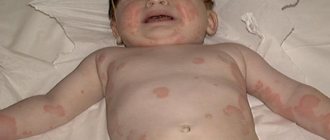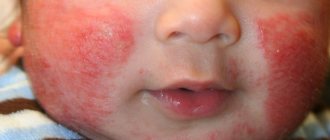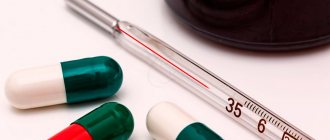Home / Health / 38.5°C in an infant without symptoms
Elevated body temperature in a child of the first year of life is a very common phenomenon. There are many reasons, from the onset of a viral disease to the development of rheumatoid arthritis. Parents need to know in what cases they need to call a doctor in order to promptly diagnose the disease and begin treatment.
Daily measurement of a baby's body temperature in the first months of his life is not a manifestation of his parents' suspiciousness! This useful habit allows you to promptly identify the slightest changes in the baby’s health.
Causes of increased body temperature in infants
Thermoregulation in children of the first year of life is not yet developed, and body temperature depends on environmental conditions. That is why the famous pediatrician Komarovsky insistently recommends protecting infants not only from cold, but also from overheating.
10 most common causes of increased body temperature in infants
- Overheat. When a baby's temperature is 38°C without symptoms, Komarovsky first of all recommends making sure that the baby is not overheated. The younger the baby, the more relevant this issue is.
- Heat stroke as a reaction to prolonged overheating. With heatstroke, body temperature usually rises in the evening, after prolonged exposure to the sun, and can remain at high levels for one to two days. Children are especially vulnerable in the first months of life.
- Teething and inflammation of the gums. During this period, the immune system weakens and the child is more susceptible to attacks by viruses and pathogens of childhood infectious diseases.
- Reaction to vaccination.
When developing immunity after vaccination, body temperature should not exceed 38°C.
- Allergic reaction (to food, medications, etc.).
- Stomatitis.
- Stressful or unfavorable conditions affecting the physical and psycho-emotional state of the child.
- Infectious childhood diseases (most often rubella, measles, mumps, chickenpox and others), which in the first few days may occur without additional symptoms.
- Inflammatory process in the child's kidneys (pyelonephritis). The pain symptom is hidden from parents, because the baby cannot yet complain of pain in the back or lower back.
- Viral or bacterial attack (other symptoms will appear after two to three days).
In the vast majority of cases, a baby’s temperature of 38°C without symptoms indicates the onset of a viral disease.
If the temperature drops easily and there are no other symptoms, there is no need to call a pediatrician at this time.
In what cases is urgent medical attention needed:
- body temperature 38°C in an infant aged one to two months;
- no improvement on the third day of illness;
- the temperature did not return to normal levels on the fifth day of illness;
- except for temperature, no other symptoms appeared;
- the baby refuses to drink and eat;
- the temperature does not decrease after using antipyretic drugs;
- convulsions, loss or disorder of consciousness are observed;
- paleness of the skin and limbs of the baby is observed.
An increase in a baby's body temperature while taking an antipyretic is a reason to call an ambulance!
What to do if you have a fever without symptoms
Parents, if their baby develops a fever, should not panic ahead of time. You should also not rush to give antipyretics, because they can only aggravate the situation. Initially, you need to measure the temperature several times using a thermometer. If the information that the baby has a fever is confirmed, then the following actions should be taken:
- Do not resort to the use of antipyretics if the temperature does not increase above 38.5 degrees.
- If hyperthermia is above 38 degrees, you should resort to wiping the baby with a damp cloth, regularly ventilate the room, and also provide the baby with something to drink.
- At 38.5 it is necessary to immediately resort to the use of an antipyretic. Children aged 6 months are recommended to use rectal suppositories. Syrups can be used only if the baby is not allergic to the components of the drug.
- If the temperature rises again, you should re-use antipyretics, but be sure to maintain a break of 4-6 hours between doses, depending on the drug.
- If signs of high fever are complicated by additional symptoms, it is necessary to show the baby to a specialist. Timely treatment can prevent the development of serious pathologies.
- Do not prescribe antibiotics to your child yourself. If the thermometer readings increase, but the antipyretic does not work, then you need to immediately call an ambulance.
The simplest preventive measures can help avoid unexpected fever in children. Even if the thermometer shows a value above normal, you should not immediately rush to a specialist. If a child with a slight increase in temperature does not show signs that he is sick, then parents need to closely monitor him. Not in all cases, parents’ concerns about elevated temperatures in infants are confirmed, so consult your local doctor about further actions.
What should you do if your baby has a temperature of 38 without symptoms?
As paradoxical as it may sound, it is necessary to make sure that the temperature is really elevated. Often, at high temperatures, children may experience so-called “white fever,” in which the child is quite cold to the touch (a reflex spasm of the vessels of the extremities occurs).
Parents need to know the standard scheme:
| Baby's body temperature | Possible actions of parents |
| up to 37.5°C | The temperature is not reduced. |
| from 37.5°C to 38.5°C | The temperature is brought down by physical methods (wiping with water at room temperature, ventilation and lowering the air temperature in the room, drinking plenty of warm water). |
| from 38.5°C | The temperature is brought down with medications (paracetamol and ibuprofen). |
The antipyretic drug, dosage and frequency of administration for the infant are determined by the attending physician, because exceeding the dose can lead to death!
It is not recommended to use alcohol or vinegar rubdowns, since the baby’s delicate skin will absorb these substances, and this can lead to poisoning. For rubbing, use boiled water at room temperature.
Parents should be prepared for a possible increase in body temperature in the infant, for which they should obtain prior consultation with the attending physician and have the necessary medications on hand. Attentive attention to the smallest changes in the baby’s behavior and state of health is the key to timely diagnosis and successful treatment!
14 Oct 2020 admin 15438
Share this post
- Related Posts
- How to protect your baby from rotavirus?
- Crusts on a baby's head. What is it, how to remove it.
- Low hemoglobin in infants
- The baby's eyes are festering. What to do and how to treat the baby?
Standardized temperature values
From the first day of life to a year, a child’s temperature can vary significantly. This is due to the fact that it is in the first year of life that the body adapts to the environment. For infants, normal temperature values are considered to be thermometer readings from 36 to 37.4 degrees. Most often, in the first year of a baby’s life, low-grade fever indicates teething in the baby.
It is important to know! At the age of 1 year, children's temperature normalizes and is 36.8-37.2 degrees.
When taking measurements, it is important to take into account the place where the thermometer is applied. If the measurement is carried out in the oral cavity or rectum, then its values will be higher. For measurements, it is best to use a regular mercury thermometer. You can also give preference to an electronic device, but do not forget that they have an error of 0.1-0.3 degrees.
It is important to know! To obtain the most accurate readings, it is necessary to take measurements at rest, that is, when the baby is sleeping or resting. You cannot measure during feeding, as the values obtained will be elevated.
A high temperature in a child under one year of age is considered to be between 37.5 and 38 degrees. For children over one year old, values from 39 degrees are considered high. If the value is above 38 degrees, you must immediately resort to the use of antipyretics. In addition, parents should know that the temperature can be reduced by ensuring comfortable conditions in the room where the baby is.
The benefit of elevated temperature is that it prevents the proliferation of pathogenic parasites in the body: viruses, bacteria and fungi. Already at temperatures above 38 degrees, active production of interferon is observed, thereby suppressing pathogenic infections.
It is important to note that if the temperature remains at the subfebrile level for three days, then this information will be useful for the treating doctor. The temperature will persist for three days due to the addition of a bacterial infection. We will learn more about the reasons below.
the child has a temperature of 37.2 without symptoms
A pregnant woman be treated for very carefully so as not to harm the baby!
Ideally, it would be better for the expectant mother not to get sick at all, but rarely does anyone manage to avoid colds and flu during the cold season. Even if you reduce contact with the outside world to a minimum, viruses can be brought into the house by an unattached family member.
Furthermore! Sometimes they attack us from the inside without any external infection, because they lie dormant in the genetic apparatus of cells, waiting for the right moment to make themselves known. Pregnancy is one of these conditions.
The protective system of the female body, due to physiological reasons, is in a state of forced oppression - immunosuppression. This is a guarantee that the mechanism for protecting the internal environment from everything foreign will not work against nascent life. Full tissue compatibility is possible only between two clones or identical twins, but not between a future mother and her baby!
However, the same immunosuppression that inhibits rejection reactions and helps maintain pregnancy makes a woman extremely susceptible to seasonal infections. If you catch one of them, act wisely so as not to harm your child!
Pregnancy: cold treatment
any chemicals during pregnancy (and the vast majority of drugs from the pharmacy are powerless against viruses), but you also need to approach herbal medicine with caution: herbs are sometimes more powerful than drugs!
Phytomictures
Preparations containing alcohol are prohibited (even in small quantities it is harmful to the fetus!), especially tinctures of immunostimulants - licorice, echinacea, lemongrass, zamanikha, Leuzea, ginseng, Rhodiola rosea... They increase blood pressure and increase the pulse rate, increasing the load on the hard worker the heart of the expectant mother and the baby’s vascular system.
His tiny heart is already beating at a frantic rhythm, making more than 200 beats per minute. To accelerate this pace means to wear out the developing heart muscle and lay the foundation for cardiac ailments.
Advice: use an immunostimulant that does not cause unwanted effects. This is horseradish, which has long been used for colds during pregnancy in traditional medicine. Grate its root on a fine grater, mix with the same amount of sugar, leave in a warm place for 12 hours, strain and take 1 tbsp. every hour during the acute period of a cold.
Pregnancy and runny nose
Vasoconstrictor drops during pregnancy
Use drugs like galazolin and naphthyzin only at the peak of a runny nose, strictly observing the dosage (1-2 drops, not a quarter of a bottle at a time!) and frequency, which depends on the type of active substance. Some drugs are used 1-2 times a day, others – 4-5 times: read the instructions carefully!
The less you use these drops, the better. Why?
1. The vasoconstrictor effect can spread to the arteries of the placenta, disrupting the blood supply to the fetus if you drip the medicine too often, for a long time or in large quantities. Some of it is absorbed through the mucous membrane of the nasopharynx, and the other flows into the esophagus and enters the blood from the digestive system.
2. Such drops have the unpleasant property of causing spasm of not only adductor but also efferent vessels, increasing swelling of the nasal mucosa. The effect begins to manifest itself from the 3-5th day of illness, forming dependence on the drug. They dropped it in - and it became easier to breathe, but an hour later your nose became even more stuffy and you reached for the drops again - it’s not for nothing that modern doctors call them drugs for the nose!
In pregnant women , such a dependence arises more easily than in everyone else: the hormonal background is such that nasal congestion is sometimes felt throughout the entire 9 months, and after childbirth, manifestations of vasomotor rhinitis magically disappear. This is another reason to be careful with vasoconstrictor drops - fortunately, modern science and traditional medicine know many other remedies for the runny nose!
Tip: rinse your nose with a weak saline solution from a syringe (table salt on the tip of a knife in a glass of water) and instill sea water-based products into your nose (Aquamaris, Salin).
Vitamins for colds in pregnant women
Colds-pregnancy-vitamins
The need for them among expectant mothers is already high, and during illness it increases. Do I need to take them additionally?
It all depends on the duration of pregnancy and the characteristics of the disease: consult your doctor! vitamins without his permission . Perhaps the doctor will advise supporting the body with ascorbic acid, which is intensively consumed during infections, or ascorutin (strengthens the walls of blood vessels and reduces the risk of bleeding during influenza).
The main thing is to keep a fine line: to compensate for the deficiency of vital substances caused by the disease, but not to create hypervitaminosis. Excess vitamin A in the early stages of pregnancy leads to malformations, and too much vitamin C and D in recent months is fraught with aging of the placenta.
Advice: load up on fresh fruits and vegetables and drink juices squeezed from them (except carrot juice). The body will absorb the vitamins it needs from them without excess.
Pregnancy-cold-honey
Honey and bee products
With their help, we usually save ourselves from respiratory infections. But it is better not to use this in the second half of pregnancy: an unborn baby may already develop an allergy, and the expectant mother may develop gestational diabetes.
Warming up during pregnancy
Pregnancy - colds - thermal procedures
Many of them are contraindicated in your situation. You may be used to taking a hot bath with salt and herbs when you have a cold . during pregnancy ! Soaring your legs is also undesirable: there is a real danger of reflexively stimulating the uterus, causing miscarriage or premature birth.
But even if nothing like this happens, the bad thing is that blood will rush to the veins of the legs (stretch them and cause swelling), and at the same time flow away from the placenta: during the procedure, the baby will suffer from a lack of nutrition and oxygen.
Tip: the expectant mother can steam her hands under a hot water tap - this is an excellent remedy for a runny nose and sore throat! Dry heat won't do any harm either. If you feel that you are starting to come unstuck, wrap a warm scarf around your neck, put on woolen socks (you can sprinkle a little mustard powder in them or cut out insoles from mustard plasters), warm pajamas and go to bed: it is possible that by morning the cold will pass without a trace.
Pregnancy: treating colds with homeopathy
Unlike traditional medications, homeopathy does not harm pregnant women.
If you feel unwell, dissolve 5 grains of homeopathic (!) anti-grippin in your mouth every 15-30 minutes, or take a tablet of flu-heel, which has the same effect, every 15 minutes for 2 hours. To consolidate the effect, continue the same for at least another 5 days, taking antigrippin every 2 hours, and flu-heel - 3-5 times a day.
Contact your doctor if:
·Failed to cope with the illness in 2-3 days.
· Temperature above 38 degrees, especially if it is accompanied by severe intoxication - a feeling of weakness, weakness, headache, vomiting.
· Plaques appeared in the throat, “plugs” on the tonsils.
·Nasal mucus or sputum has become yellow-green in color and/or has blood in it.
· A severe headache occurred in the forehead and eyes, aggravated by bending over.
· Worried about severe cough, wheezing, difficulty breathing.
Advice: it is better to call a doctor in the morning, when the painful symptoms are more pronounced and it is easier for the doctor to make a diagnosis and select the correct treatment.
Pregnancy: severe runny nose
Treatment of runny nose during pregnancy
It is difficult for mommy to breathe - and less oxygen reaches the baby. Moreover, with abundant mucus secreted from the nose, your body loses up to 2.5 liters of fluid. Drink more - losses need to be replenished!
· Place an additional pillow under the head of the head: this will reduce swelling and inflammation in the mucous membrane, and it will become easier to breathe.
·Massage the points at the outer base of the nostrils with the tips of your index fingers - nasal congestion will immediately decrease.
·Several times a day, apply a little “Star” balm to the bridge of your nose, temples and those places on your face where you feel discomfort.
·A hot infusion of plantain, wild strawberry leaves and St. John's wort helps with a runny nose and sinusitis: 2 tbsp. Pour a glass of boiling water over spoons of any herb, leave for 30 minutes, strain and drink half a glass 2-3 times a day.
· Well cleanses the nasal cavity, making breathing easier, soda-tannin drops: brew a teaspoon of tea with a glass of boiling water, evaporate for 15 minutes over low heat, strain through cheesecloth and add a teaspoon of baking soda. Place 1-2 pipettes into each nostril 2-3 times a day, and then be sure to blow your nose.
· Herbalists recommend pouring 6-8 drops of fresh juices (carrot and apple) or herbal infusions into each nostril 3-4 times a day. The latter can also be used in the form of inhalations - 3-4 daily procedures for 5 minutes:
·1.Mix St. John's wort, willow and oak bark, linden flowers and mint leaves (1:1:2:2:2). Pour 2 tbsp. collecting a glass of boiling water. Leave in a thermos for 3 hours, strain and add 3-5 drops of fir oil before use.
·2.Take equal parts of yarrow and oregano herbs, sage leaves, tricolor violet root and viburnum bark. Pour 2 tbsp. collecting a glass of cold water, leave for an hour, bring to a boil, keep on fire for 5-7 minutes, cool and strain.
·3.Make a collection of equal parts of pine buds, wild mallow flowers, coltsfoot leaves, willow bark and oregano herb. Prepare the infusion as in No. 2.
Pregnancy: temperature
Treatment of temperature during pregnancy
· If the temperature rises sharply, and you feel chills and can’t warm yourself up, your hands and feet are icy, cover yourself with a blanket, drink several glasses of hot diaphoretic tea and apply heating pads to your palms and soles. This will help expand the narrowed blood vessels of the skin, causing a rush of blood, and thereby increase heat transfer. When you warm up, begin to reduce the heat with your grandmother’s traditional remedies: rub your body with vodka or 3% vinegar half diluted with water (during the procedure, undress and do not rush to wrap yourself up right away.
·For fever, brew herbal tea: 2 tbsp. dried or extracted raspberries from jam. 4 leaves of coltsfoot, 3 plantain, 2 oregano. Another recipe: 1 tsp. Finely chopped white willow bark, pour 1 cup of boiling water, cool. Drink 1 tablespoon 4 times a day.
·prepare the pine cocktail in advance. Grind 100 g of young fir shoots or pine buds and 50 g of raspberry roots. Place in a glass jar with 100 g of sugar. Add 1 tbsp. boiling water, leave for 24 hours, and then heat in a water bath for another 6-8 hours. Leave to stand for 2 days, drain off the resulting bright raspberry juice. Store it in a cool, dark place and take 1 tbsp. 4-5 times before meals.
Pregnancy: Sore throat
Treatment of the throat during pregnancy
·Take 1 teaspoon of pharmaceutical rosehip syrup, 2 tbsp. beet juice and kefir. Squeeze the juice of ½ lemon into this mixture. This drink is useful for those suffering from chronic pharyngitis and tonsillitis.
·Drink at night (already lying in bed) a milky decoction of sage. 1 tbsp. dry herbs, pour a glass of milk, bring to a boil, simmer for 10 minutes over low heat, then strain and bring to a boil again.
· It is better for expectant mothers not to use lollipops and pharmaceutical tablets for sore throats. Replace them with traditional remedies: hold a teaspoon of sea buckthorn oil or Vitaon in your mouth, a piece of aloe leaf cut across.
· Prepare an antiviral mixture for rinsing: birch leaf, eucalyptus and sage (1:2:3). 1 tbsp. pour a glass of boiling water over the mixture, leave in a warm place covered for 15-20 minutes, strain.
·Every 2 hours, gargle with warm boiled water with onion or beet juice (1:1) or a warm infusion of one of the herbs - St. John's wort, sage, chamomile, calendula, eucalyptus. Pour 1 tbsp. raw materials with a glass of boiling water, leave for 15-20 minutes, strain. Using the same recipe, taking the components equally, you can prepare a rinse from herbal infusions, only you need to infuse them longer - 1-2 hours: No. 1 - lingonberry leaves, St. John's wort herb, raspberry flowers, small-leaved linden and mountain ash; No. 2 – immortelle flowers, raspberry leaves and horsetail grass.
Pregnancy: lost voice
Procedures for the treatment of throat in pregnant women
Do not try to talk, even in a whisper - this can be even more dangerous. Than loud speech. During laryngitis, when whispering, the vocal cords become tense, as if screaming. You might even lose your voice!
Inhale the fragrant steam every 30 minutes. Pour a glass of boiling water over the herbal mixture and leave it covered for an hour. Composition of infusions:
·1/2 teaspoon of wild rosemary leaves, 1 tsp of great plantain leaves and 2 tsp. coltsfoot leaves;
· 3 tsp each pine buds or lavender herbs and chamomile flowers;
·2 tsp. tricolor violet herb and 1.5 tsp. herbs of the tripartite succession;
· 1 tsp each coltsfoot leaves. Mullein flowers and elder flowers.
Don't gargle! Still, not a drop will get into the larynx - during the procedure it is tightly covered by the epiglottis. And sounds when rinsing can cause damage.
Pregnancy: cough (dry or wet)
Treatment of cough during pregnancy
At the beginning of the disease, when the cough is dry, drink and breathe over the steam of infusions and decoctions of chamomile, plantain, sage, trifoliate, and linden blossom. They soften the larynx and bronchi, soothe the irritated mucous membrane of the respiratory tract and have an anti-inflammatory effect.
After 2-3 days, after the cough becomes wet and sputum begins to disappear, switch to herbal decoctions with a drying, astringent and expectorant effect - snakeweed, lingonberry and eucalyptus leaves, wild rosemary, yarrow and string.
For a lingering cough that doesn’t go away by the end of the week. You should be examined by a doctor to rule out pneumonia.
The long-awaited moment has arrived - conception and the first days of pregnancy. Now the doors to a new and yet unknown life are opening for a woman, of course, if we are talking about her first pregnancy. Joy fills a woman’s soul, but the physical side does not always manifest itself positively. Many processes occurring in a woman’s body, although they are a completely natural reaction to pregnancy (toxicosis, dizziness, drowsiness, fatigue...), are perceived by the expectant mother as questioningly and surprisingly, and sometimes they literally exhaust and “harass”, squeezing out all the strength and “exhausting” "All the nerves. It’s not for nothing that pregnant ladies are very moody and irritable. From here the countdown to childbirth begins and, of course, a mass of “why?” arises, which, like “balls” on a billiard table, are looking for their cell. A woman is trying to find, hear, learn from someone or read answers, useful information. After all, pregnancy is the first steps of responsibility not only for oneself. Now in the hands of a woman is the life of an unborn child, but already existing within herself and “registered in the heavenly office” because her heart is beating... That is why it is very important to try to insure both him and yourself from dangerous phenomena and achieve the desired result. Every day, when we get out of bed, we tune in to the previous day. Our heads are full of plans - what to do, where to go, what to cook, etc. We must not forget about our health, on which the normal course of pregnancy depends. And just as we were taught from childhood to regularly wash our faces and brush our teeth, so a pregnant woman should develop the habit of listening to her feelings and manifestations of the body.
Normal temperature during pregnancy.
If a woman experienced measuring basal temperature before pregnancy, she knows that body temperature can change depending on the phase of the menstrual cycle. That is, at the beginning of the cycle, the temperature can rise on the thermometer scale to 36.8°C, with the onset of ovulation it can drop to 36.6°C, and before the start of menstruation it can reach 37.2°C. Basically, everything depends on physiological manifestations and is purely individual for each woman. Therefore, the temperature level may be slightly less or more than the specified data. This rule also applies to the average body temperature, which is approximately 37°C (plus or minus). In the first months of pregnancy, a woman should not be afraid of a body temperature of 37.2°C, it can be higher. From the moment of intrauterine development of the fetus, the female body begins to produce a decent “dose” of progesterone, which greatly affects the high level of temperature. This manifestation of the body is a special reaction to pregnancy. To completely avoid doubts, to calm your soul, it is advisable to consult with your gynecologist-obstetrician.
What should you be wary of?
Spring, summer, autumn, winter, no matter what period of the year you carry a baby under your heart, and although you always carefully monitor your health, disruptions in the functioning of the immune system are possible. Therefore, if you feel various “unpleasant” symptoms - weakness, chills, or vice versa fever, be sure to measure your temperature. If it exceeds 37.8 C, then it is urgent to take action. An elevated temperature may indicate some kind of inflammatory process occurring in your body. This could be a manifestation of some kind of infection, cold, flu, or as a consequence of the malfunction of one of the organs (kidneys, liver, stomach...). I would like to note that a temperature above 38 C, which does not drop for a long time, is considered very dangerous for the development of a child. It can cause serious problems in the baby:
- during the formation of the central nervous system;
«>
provoke muscle hypotension;
underdevelopment of various parts of the body, face; microcephaly; the birth of a child with fingers that look fused (syndactyly). To prevent such a danger, it is better to immediately visit a doctor or urgently call him and get emergency advice. In most cases, elevated temperature is a consequence of ARVI. We must not forget about low temperature, up to 12-14 weeks of pregnancy, while ideally it should reach 37C, this is a signal for a woman about the danger of miscarriage, that is, there is a threat of termination of pregnancy.
How to avoid it?!
It’s good if you haven’t encountered the difficulties described above. But if this has already happened, try not to panic and try to cure yourself. Many medications are not recommended for pregnant women and may cause problems. Only strictly according to the prescription prescribed by the doctor! The safest method of fighting a cold, if you do it yourself, is folk remedies. It is better and more pleasant to drink tea with lemon if you are not allergic to raspberries or honey. You can boil jacket potatoes for dinner and breathe over the pan, inhaling the vapors emanating from the potatoes. Two pleasures in one! Don’t forget about warm milk with a piece of butter, rose hips, herbal teas... It’s not for nothing that our grandmothers and great-grandmothers gave birth to healthy babies











